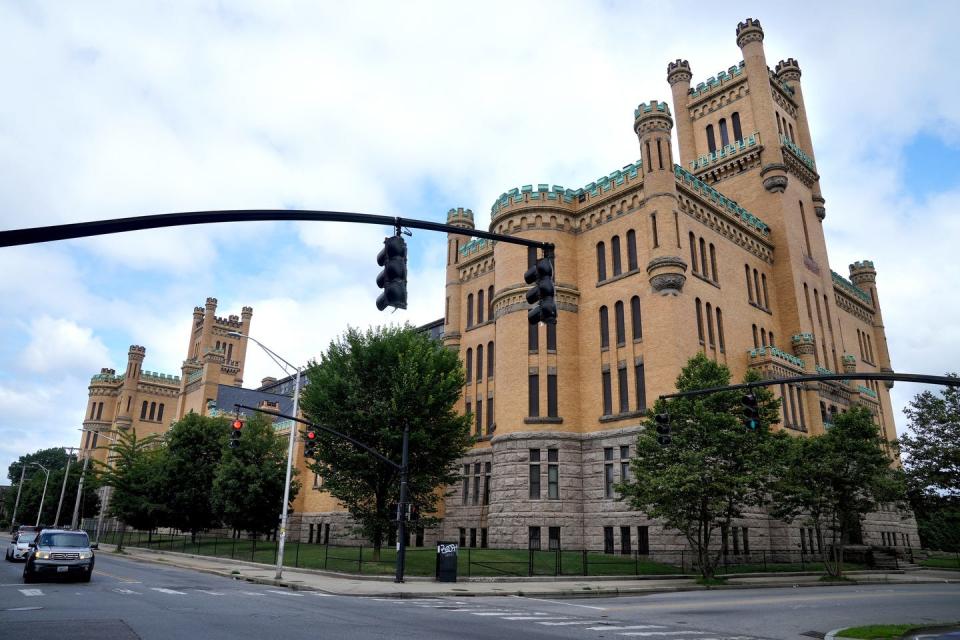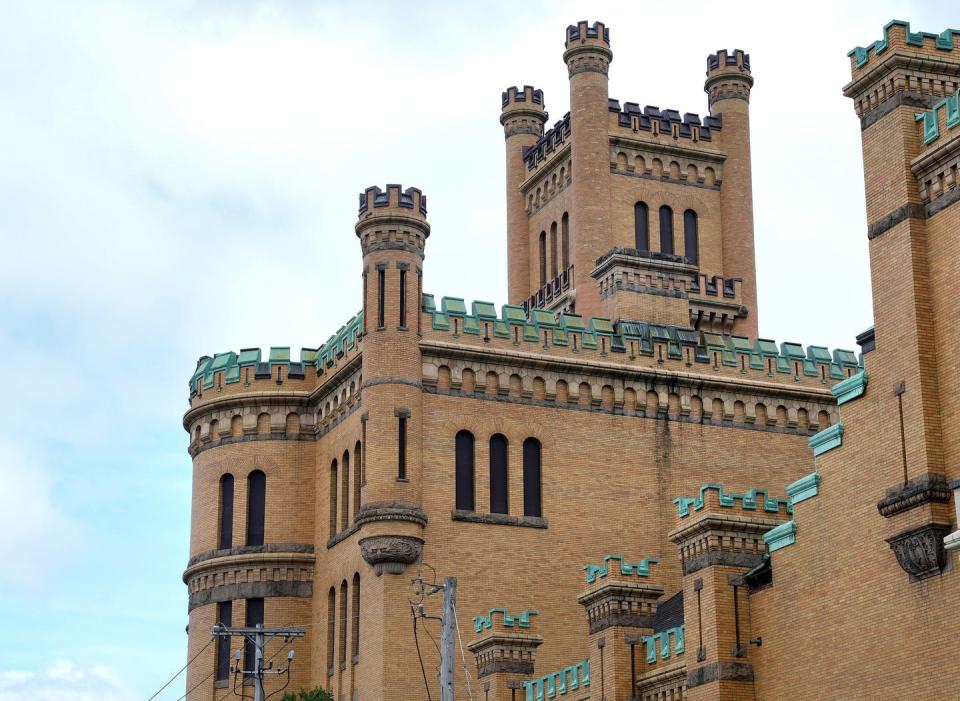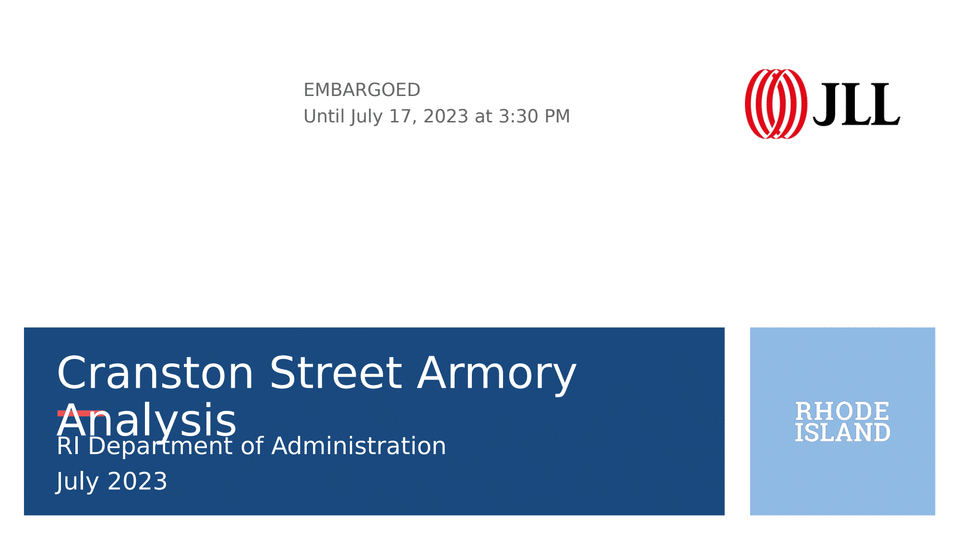State terminates Armory contract, may give building to Providence. What we know.
PROVIDENCE — Armed with a sharply negative new analysis of the latest in a years-long series of proposals to put the castle-like Cranston Street Armory to modern-day use, the McKee administration on Monday terminated the state's contract with whistle-blowing developer Scout Ltd.
It appears to be start from scratch time, again, nearly three decades after the R.I. National Guard vacated the cavernous building in late 1996,
"It became clear that the proposal put too much risk on Rhode Island taxpayers and not enough on other sources," Gov. Dan McKee told reporters at a State House press conference.

State may hand over ownership of Cranston Street Armory to Providence
On Monday, McKee and Providence Mayor Brett Smiley also publicly acknowledged for the first time that they have had "preliminary discussions" about the state handing the castle-like Cranston Street Armory over to the city to redevelop as it sees fit.
City Spokeswoman Patricia Socarras told The Journal:
"We are in ongoing discussions with the state regarding a transition in ownership of the Cranston Street Armory property and what that could look like. Any transaction would necessitate a provision for adequate capital improvement funding to ensure effective rehabilitation of the facility, which is critical to future development of the site," she said.
It is not yet clear what any of this might mean to the hopes and dreams of the passionate advocates who live in the city's historic Armory District who took part in the dozens of meetings that led to the state hiring a developer with a $56-million plan for putting the former Rhode Island National Guard fortress to new use.
While the review by real estate firm Jones Lang LaSalle "concluded [Scout's proposal] is not in the best financial interest of the state or its taxpayers," McKee said, redevelopment of the Armory could undoubtedly "bring much needed economic stimulus" to the West End of Providence.
Providence Council President Rachel Miller was upbeat, saying: "There is a future for the Armory, and I look forward to working with Mayor Smiley and the State on exploring a transition that makes financial sense for Providence taxpayers."
But the two legislators who represent the Armory District − Sen. Sam Bell and Rep. Enrique Sanchez − blasted the termination of the state's contract with Scout, calling it an act of retribution by McKee.
“Retribution on this scale makes my stomach churn,” said Bell. "The culture where state contractors got extorted for kickbacks and would lose the contract if they even dared to speak up about it [is] one of our state’s greatest shames."
"To be so close to a great redevelopment and then to have Governor McKee try to stop it is such a slap in the face to the whole community," said Sanchez, demanding the administration reschedule a cancelled community meeting.
More on the Cranston Street Armory: For decades they pushed to revive Cranston Street Armory. All they have is an empty shell.
Relationship with Scout soured after scandal
It is unclear how easy it will be for the state to sever ties with Scout, the Philadelphia-based urban design firm that proposed an ambitious reuse of the building – including a soccer field in the former drill hall and state offices in the towers − and then blew the whistle on alleged misconduct during a visit to Philly by two state officials in March.
Relations soured after Scout's top executives sent the governor's office a detailed rundown of what happened during that March 10 visit and the attorney general's office forced McKee to release it in response to appeals by The Journal and WPRI.

Contract does not appear to allow another developer
The state's signed agreement with Scout designates the firm as the "master developer for redevelopment of the historic [Armory} into a thoughtful and community-centric development."
It also says: "If State fails to move forward with the project, but later decides to move forward with any development of the property, Scout will remain the master developer and State must contract with Scout, and no other developer."
Asked the legal basis for severing that agreement, the administration made public the termination letter sent Scout Managing Partner Lindsey Scannapieco on Monday. It cites several state laws, including one giving the state an out of any contract if "funds are not appropriated."
The letter says in part: "Funding for future development of the Cranston Street Armory was not expressly appropriated by the General Assembly... Therefore, the Department of Administration is...exercising its termination rights under Rhode Island law."
There has been no public response yet from Scout.
Real estate firm questions if Scout plan is financially sound
The state's move to terminate the Scout contract came on the same day Department of Administration Director Jonathan Womer − and Brian Daniels, head of the state's Office of Management & Budget − made public the findings of the real estate firm McKee hired to review Scout's proposal.
The $84,000 consultant − Jones Lang LaSalle − concluded Scout's $56.7-million re-use proposal was conceived in a different, pre-COVID economic climate when there was more of a need for commercial office space than there is now.
More on the Armory: Scout speaks out on Philly scandal, says RI officials acted 'bizarre' even before trip
Others potential downsides to the Scout proposal, according to JLL:
Scout counted, in part, on $19 million in federal COVID-relief dollars that have since been targeted elsewhere, and $3.75 million in philanthropic commitments it has not yet locked down.
The projected cost goes from $56.7 million to $72 million when "soft costs" – such as legal, public relations and design work – are included, with no equity investment by the developer.
Scout's fees are out of line. For example, at 6% of total project costs – a potential of $4,556,453 – Scout's "developer's fee" is more than the typical 3%-5% fee, the report says.
Even under the rosiest circumstances, the proposed deal would leave the state $10.5 million in the hole over 15 years, with the state paying about $700,000 annually to lease office space in a building it owns.
JLL acknowledged the potential for as many as 400 full-time-equivalent jobs during the construction, 175 later with "income taxes, and indirect benefits."
"These cash streams, if realized over 15 years, could be worth over $50.4 million of fiscal benefit to state and local authorities, including indirect tax revenues,'' but the potential "cost to the State over a 15-year period for the adaptive reuse of the Cranston Street Armory ... is approximately $60.9 million," the report says.
The difference: $10.5 million.
By way of comparison, the state provides the Rhode Island Convention Center – which was originally sold to taxpayers as a self-sustaining operation – with an operating subsidy of more than $20 million annually.
Summing up JLL's findings, McKee said: "First, under the proposal, the state and taxpayers would lose a minimum $10.5 million on their investment.
"Second, the state and taxpayers would bear 100% of the financial risk of any construction or operating cost overruns and third, while the state is being asked to invest a minimum of $60.9 million in taxpayer funds...the developer is vesting zero dollars in the project which I was never comfortable with."
"If the proposal’s assumptions turn out to be overly optimistic, the redevelopment efforts could result in even greater losses to the State and taxpayers," according to the governor's office.
Even empty, the Armory costs money
One of the big issues left unaddressed by the JLL report: leaving the Armory vacant for several more years while the state develops – and vets the responses – to a new request-for-proposals will still cost the state millions annually.
"Conservative estimates see a continued minimum investment of $20 [million] - $25 million dollars over the next 10 year period (2022-2032) to solely secure and maintain the exterior building condition," plus "utilities and management [that] today cost the State of Rhode Island $2.2 million per annum with no public benefit," according to Scout's original proposal.
Page 1 of JLL briefing

Contributed to DocumentCloud by Whitman Littlefield (The Providence Journal) • View document or read text
Read More: The entire Cranston Street Armory Analysis by the RI Department of Administration
Transition to city ownership still leaves questions for the Armory
Among the many unanswered questions:
How much the city would need - and the state would be willing to commit to giving the city - for an Armory turnaround.
Whether the state would also commit to the on-going maintenance and upkeep of the massive building.
Whether city ownership would lead to a brand new request-for-proposals, with different aims than the one to which Scout responded during the Raimondo era, and another potentially lengthy vetting period.
This article originally appeared on The Providence Journal: Providence could take ownership of Cranston Street Armory

